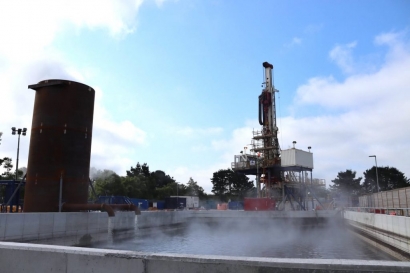
GEL and other partners have also been trialling sustainable, zero carbon methods of removing the lithium from the fluid, so far managing to achieve a 95% extraction rate. Testing has also shown that the magnesium concentration, a metal which can make processing more difficult and expensive, is extremely low. Based on the findings of these tests, GEL is looking at the potential to produce 4,000 tonnes of lithium per year from the next sites it is planning by 2026.
Lithium is a naturally occurring metal found on almost every continent but is currently mined in South America and Australia. It is then shipped to China for processing into battery-grade lithium. Finally, batteries are sent to Europe to be installed in electric vehicles. The UK currently produces no lithium onshore and the carbon footprint of delivering lithium-ion batteries is significant. The race is on to produce locally sourced, zero carbon lithium. The Faraday Institution, a government-backed body set up in 2017 to promote the battery industry, estimates UK demand for lithium could reach 59,000 tonnes a year of lithium carbonate equivalent by 2035, based on projected growth in domestic battery demand.
Ryan Law, Managing Director of Geothermal Engineering Ltd said, “Deep geothermal heat and power are already set to help the world reach net zero targets. The addition of lithium production with no carbon footprint or environmental damage will help to drive more geothermal projects forward in the UK and offer more opportunities for green jobs.”
“If the UK is to reach the government target to produce only electric vehicles by 2035, we have to find more sustainable and geopolitically more reliable ways to deliver lithium batteries. Establishing meaningful onshore lithium production in the UK would also encourage a lithium-ion battery-based economy to develop in the UK and could attract further important inward investment opportunities for Cornwall and the Southwest.”
GEL recently announced that Heads of Terms have now been signed on the four new geothermal sites planned for Cornwall, each anticipated to deliver 5 MWe (Mega Watt electrical) of power, 24/7 to the National Grid and 20 MW of heat energy for the local area. The electricity produced from all four power stations will be enough to power 45,000 homes. Each plant will each take around 18 months to complete, with all four sites anticipated to be up and running by 2026. Lithium tests will be conducted at each of the new sites as drilling gets underway.

